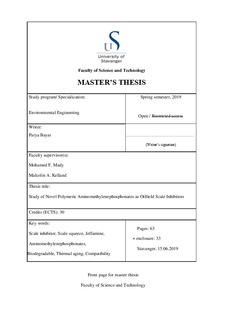| dc.contributor.advisor | Mady, Mohamed F. | |
| dc.contributor.author | Bayat, Parya | |
| dc.date.issued | 2019-06-12 | |
| dc.description | Master's thesis in Environmental engineering | nb_NO |
| dc.description.abstract | Scaling is one of the most frequently stated problems with the oil industry and scale inhibitors (SI) are applied to prevent the formation of the scale layers on the surface of the field facilities or the formation rocks. Examples of the well-known types of SIs are organophosphonic acid compounds and their salts, which can be found as both non-polymeric and polymeric molecules with attached phosphonate groups. However, the performance of phosphonate base SIs is limited by their poor compatibility with calcium ions. Therefore, there is still a need to develop SIs with reliable calcium compatibility and thermal stability at high temperature and high-pressure formations along with being environmentally acceptable.
The specific objective of this study was to design phosphonate base SIs applicable in high temperature and high-pressure formations with characteristics including high calcium compatibility, thermal stability and biodegradability. In the present study, several novel phosphonated polyetheramines were synthesized from Jeffamine polyetheramines due to their known biodegradability, biocompatibility and non-toxic characteristics. The final products were evaluated for their carbonate and sulfate scale inhibition performance using a high-pressure dynamic tube blocking rig at approximately 80 bar and 100 oC. The compatibility with calcium ions, thermal stability and the biodegradability (in seawater) of these products were also examined.
This study showed that the phosphonated polyetheramines had a significant positive performance on both barite and calcite scale formation, in comparison of the findings with those of other studies on commercial aminophosphonate SIs such as diethylenetriaminepentakis- (methylenephosphonic acid) (DTPMP). For example, the results from this thesis revealed that Phosphonated Jeffamine EDR-176 (P.EDR-176) was found to be the most potent scale inhibitor with a fail inhibitor concentration at 2 ppm for sulfate scale and no formation of the calcite scale even at 1 ppm (the lowest concentration of the injected SI). The second major finding was that all the synthesized SIs showed significant compatibility with calcium ions. Moreover, the investigation of thermal aging test indicated a small decay of scale inhibition performance in this study. However, the poor biodegradability for some of the tested SIs in seawater, according to OECD 306, is the main challenge.
Therefore, this study makes a major contribution to research on phosphonated polyetheramine as potential scale inhibitors with significant calcium compatibility for the oilfield applications. | nb_NO |
| dc.language.iso | eng | nb_NO |
| dc.publisher | University of Stavanger, Norway | nb_NO |
| dc.relation.ispartofseries | Masteroppgave/UIS-TN-IKBM/2019; | |
| dc.subject | teknisk miljøvern | nb_NO |
| dc.subject | miljøteknologi | nb_NO |
| dc.subject | offshore teknologi | nb_NO |
| dc.subject | environmental engineering | nb_NO |
| dc.subject | biodegradable | nb_NO |
| dc.subject | scale inhibitor | nb_NO |
| dc.subject | aminomethylenephosphonates | nb_NO |
| dc.subject | thermal ageing | nb_NO |
| dc.title | Study of Novel Polymeric Aminomethylenephosphonates as Oilfield Scale Inhibitors | nb_NO |
| dc.type | Master thesis | nb_NO |
| dc.description.version | submittedVersion | nb_NO |
| dc.subject.nsi | VDP::Technology: 500::Marine technology: 580::Offshore technology: 581 | nb_NO |
| dc.subject.nsi | VDP::Technology: 500::Environmental engineering: 610 | nb_NO |
